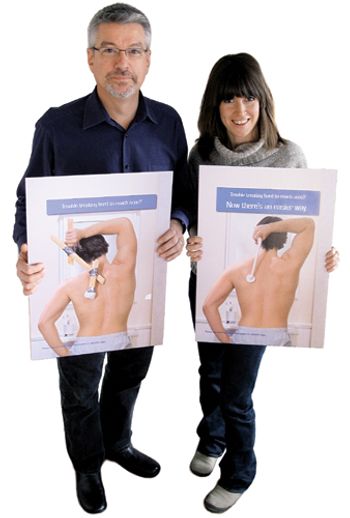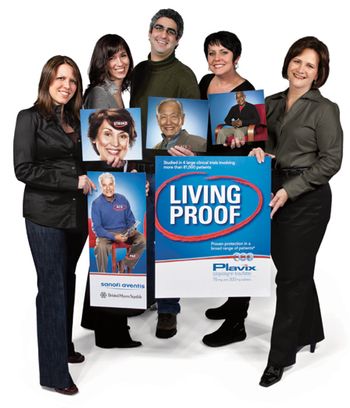
All News


After months and months of back and forth over the true value of Genentech, Roche finally got the good news it's been looking for: Genentech's board of directors, this morning, approved Roche's latest offer of $46.8 billion ($95 per share) to acquire all shares of the biotech giant.

WOTY-How the Award has changed the face of the industry.

The Merck acquisition of Schering-Plough may have surprised few, the approach has raised some eyebrows. Rather than buy the company outright, Merck going through a convoluted reverse merger deal to keep Schering's licensing deals secure. Was it the right move?

Manhattan Research singled out type 2 diabetes sufferers and their online search patterns; it turns out diabetes patients are less likely to confront doctors about branded drugs they?ve seen in DTC ads, yet more apt to take Lipitor.

All signs point to Genentech acquisition.


To educate anesthesiologists that post-operative nausea and vomiting (PONV) is "no fun for anyone," GSW Worldwide created WoozyWorld.com, a "non-amusement" that highlights the need for MGI Pharma's 72-hour antiemetic Aloxi.

ClindaReach, from Dusa Pharmaceuticals, offers a simple and practical solution for patients with acne in hard-to-reach places: ClindaReach, an application wand.

Ambien CR, the sleep medication that "helps you fall asleep fast and stay asleep" caught the eyes (and ears!) of consumers with, well, a rooster.

It's not unusual for creative teams to ask actors to work up on-screen tears. But when you go from crying actors to crying babies, it makes all the difference.

How do you generate excitement for 5,000 sales reps who promote a product in a changing marketplace? You give them VIP tickets to the Plavix Plan of Action Premiere and reenact a blockbuster Hollywood movie debut! Of course it helps to build anticipation, which is exactly what Torre Lazur McCann did with its six-week direct mail campaign to get Bristol-Myers Squibb and Sanofi-Aventis' sales reps ready for the big event.

The last thing on the mind of an adventurous traveler is a pre-trip immunization, which, consequently, is not top-of-mind for their healthcare providers, either.

Flashpoint Medica's "Little girl, big shoes" campaign was used to portray the problem of central precocious puberty for the launch of Supprelin LA from Indevus Pharmaceuticals.

"Tired of your old birth-control routine?" the spot asks. "Maybe it's time to break free from the pack with NuvaRing."


CV Therapeutics and Genetech rejected offers from big-name suitors. Are they playing hard to get or are they just not that into them?

A sign of the times or a rash decision? In an effort to curb unnecessary costs, Pfizer kills development of two late-stage products rather than sink more money into them.

Reflector welcomes the signs of EU agreement on encouraging the development of rare disease treatments.

Two pharma companies dabble in online video in two different but effective ways. Sanofi-aventis attempts to reach patients through educational videos, while AZ calls for consumers to upload their own testimonials.

Pfizer is the latest addition to Big Pharma's data disclosure club; the drug giant will be disclosing all physician payments that total more that $500 a year.

GlaxoSmithKline to lay off thousands while embattled KV Pharma drops 40 percent of its work force in latest wave of cuts.

Communications planning in 2009 and beyond will include online, offline, mobile, out-of-home, point-of-sale, gaming consoles, and more-even your car's navigation system will be tied to Google! Perhaps most importantly, communications planning will begin to include social influence marketing.

Facing patent expiry for one of its top drugs and an overabundance of sales staff due to recent acquisitions, King announced that it would eliminate 760 jobs.

June 2008 Sworn Statement

No one who cares about global health can be happy with a system that only "eventually" delivers drugs and vaccines for the planet's neediest people

Pfizer hit hard with the surprise purchase of Wyeth. But will the pharma giant strike out in the long run? Analysts ponder the long and short-term ramifications of this monster acquisition.

As pharmaceutical companies look to emerging markets to offset slowed growth at home, success will depend on efficient re-use of regulatory content to target new high-growth markets.

To increase impact and effectiveness, personalized Web sites should be constructed in different ways to interact with multiple audiences.

A new study suggests the medical professionals are more active on social networking sites than ever before. With the rise of doctor-specific Web 2.0 outlets, pharma has a new tool for reaching elusive physicians. The best part: Doctors don?t seem to mind.